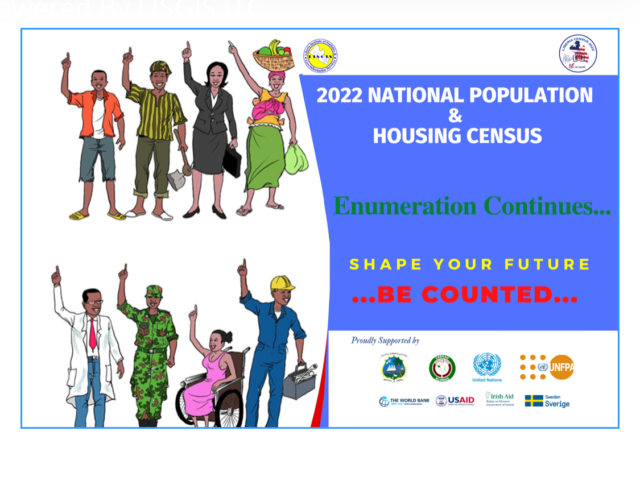
Census involves the complete enumeration of the population of a country. It shows the number of household members, tribal groups, and religions.
Its results are used to impact programs, planning, and policies for the welfare of the development of a country.
Article 39 of the 1986 constitution of Liberia states that “the Legislature shall cause a census of the Republic to be undertaken every ten (10) years.” Since its independence in 1847, according to the Liberia Institute of Statistics and Geo-Information Services (LIGIS), Liberia has conducted four censuses, with 1,016 in 1962, 1,503 in 1974, 2,102 in 1984, and 3,477 in 2008, respectively.
By law, the next census was expected to have been conducted in 2018. Still, according to the United Nations Missions in Liberia’ (UNMIL) February 21, 2018 report, which was extracted from the Daily Observer, “the House of Representatives and the Senate decided to postpone the March 26, 2018, scheduled national census to an undetermined future date because the government cannot raise its share of 50 per cent of the USD20 million needed to carry out the national census.”
Controversy over postponement
The new date for the organisation of the country’s census was not without controversy.
An AllAfrica August 31, 2022, report explained that “the Liberian Senate, after a lengthy plenary discussion on June 16, 2022, moved the census to March 18 to 30, 2023, pending a concurrence by the House of Representatives, although the Liberia Institute for Statistics and Geo-Information Services (LISGIS) had proposed 16 to October 28 2022 for the conduct of the 2022 census.”
The report also showed that on July 25, 2022, International Partners, including ECOWAS and the United Nations, wrote a letter that was signed by UN Resident Coordinator Niels Scott and co-signed by Finance & Development Planning Minister Samuel D. Tweah, Jr., who chairs LISGIS board, advising President Weah about the financial implications and ramifications if the census is postponed to March 2023.
The partners argued that the obligatory payments to census staff would be negatively impacted if the census is delayed further.
They indicated the postponement would also affect the loan agreement between Liberia and Ghana regarding providing 21,000 tablets and power banks, respectively.
The partners also warned about donor fatigue regarding the payment of nearly US$800,000 if the census isn’t held in October. A postponement to December means the government and its partners must raise US$2 million amid global economic challenges.
In total, more than US$8.8 million would have been lost if the census wasn’t held in October,” the report indicated.
On August 10, 2022, President George Weah formally wrote to Members of the 54th Legislature to convene a Special or Extraordinary Session for 30 days to discuss, among many things, “the setting of a new census date.”
A Daily Observer report quoted President Weah as saying, “the postponement of the Census from October 2022 to November 2022 will create an added staff cost of US$139,000; December 2022, is staff cost of US$278,000; and in March 2023, a staff cost of US$695,000.
Through south-south cooperation, the Government of Ghana loaned the Government of Liberia 21,000 electronic data collection tablets and accessories, which will be returned at the end of October 2022.
If the census were not in October 2022, these devices would be returned, and the Government of Liberia will have to purchase its electronic tablets at US$5,355,000. Also, the financial commitment by donors may not be fulfilled if the census was not conducted in October 2022,” the President noted.
On September 15, 2022, President George Weah signed into law a Joint Resolution of the National Legislature for the conduct of the National Housing and Population Census, following a joint resolution from the Senate and House of Representatives authorizing the Executive Branch of Government to conduct the National Census from October 24 to November 7, 2022.
But according to an October 21, 2022, publication of the Daily Observer Newspaper report, with just four days to kick off the fifth and first digital National Population and Housing Census (NPHC), on October 20 2022, the census was postponed by 15 days following a consensual decision reached during a leadership meeting with authorities of the Liberia Institute for Statistics and Geo-Information Services (LISGIS) and the head of Liberia’s Census Fund the UNFPA. As a result, President Weah, by proclamation, declared Friday, November 11, 2022, as “National Census Day,” and it was observed throughout the Republic as a National Holiday.
The date is fixed; thus, new challenges set in
November 22, 2022, Frontpage Africa publication authored that “the initial ten days stipulated for the conduct of the 2022 national population and housing census elapsed, but only 40,027 people, representing less than five per cent of the estimate, were counted.”
The slow pace of the counting, according to LISGIS, was mainly due to “logistical challenges and difficulties in reaching hard-to-reach counties in the Southeast,” the report added.
DUBAWA spoke with a few Liberians about what they make of the drama surrounding the 2022 national census and how they feel about the entire exercise:
“I feel awful about how this whole census business is going. After they told us to stay home, my house of six human beings has not even been counted. I don’t trust whatever result LIGIS may come up with, and I’m not interested because the news outside there has not been so encouraging,” Benaweh Harris, a Towel Hill, Margibi County resident, said.
A resident of Central Monrovia, Alice Weegar, also stated, “they never count my children and me. They only came to my house and marked it. Since they left, they haven’t come back to count us. They’re not doing well at all.”
Apart from the difficulties in getting people to count, there were also many discrepancies, complaints about corruption, frustrations, disenchantments and misunderstanding that characterised the 2022 census process.
Enumerators and supervisors have protested across the country and expressed distrust in the conduct of the census. The former Acting Director General of LIGIS, Wilmot Smith and his Deputy, Alex Williams, were sacked by President George Weah on November 14, 2022, on administrative grounds.
The Liberia Anti-Corruption Commission (LACC), however, on June 16, 2022, issued its “Final Report on LISGIS Corruption Investigation.”
The LACC report, in its nine-count findings and analysis, showed that the Director General of LISGIS, Francis Wreh, his Deputy Director General for Administration, Lawrence George, former Deputy Director General for Information Coordination Wilmot-Smith, among other high-ranking officials, made several illegal monetary transactions intended for the National Housing and Population Census (NHPC), for which their prosecutions were recommendation by the LACC.
Census results and matters arising
Justina Harris, the Communication Director of LIGIS, disclosed to DUBAWA through a telephone interview on Thursday, January 19, 2023, that “by next week, the provisional results will be out.
As for the final results, it will take months before they can be out because a lot of things still need to be done,” she stated.
Meanwhile, in a WhatsApp call interview with DUBAWA on February 4, 2022, former Deputy Director General for Statistics and Data Processing of LISGIS, Alex Williams, said, “corruption took the total stage while I was at LISGIS. I wrote multiple communications about the situation, but there was no result, and so, on November 12, 2022, I tendered my letter of resignation to the board of directors of LIGIS. Unfortunately, on November 14, two days after I resigned, I saw on the Executive Mansion that I was dismissed.”
Williams, who labelled the 2022 census as “a flaw, failure and an embarrassment to Liberia,” stated, “the census results could not have been announced the time it should have because there are no real results and people have to take time to manipulate the results by adding random numbers.”
“I want to tell the folks at LIGIS to be honest to the Liberian people and tell them that they (LISGIS) haven’t done a good job. The Liberian people themselves shouldn’t accept any result coming from LISGIS. The new government should conduct a new census that would be more scientific, legitimate and realistic,” Williams indicated.
He explained that “one of the fundamental reasons why the census is conducted is to impact programs, planning and policies for the welfare of the development of the country.”
“The census results should be utilised for setting a threshold, after which the National Elections Commission (NEC) should use for electoral constituency demarcation before voter registration. That constitutional provision also will not be satisfied in the upcoming elections because of the timing and the inept nature of those at LIGIS. This could lead to the manipulation of census results for political reasons,” Williams averred.
Gloria Wleh
”The researcher produced this explainer per the DUBAWA 2023 Kwame KariKari Fellowship in partnership with The Stage Media – Liberia, to facilitate the ethos of “truth” in journalism and enhance media literacy in the country.”




